10 Best Foods To Keep Your Lungs Healthy And Boost Your Immunity

Lung health is important to maintain, especially during times of this dangerous pandemic. The COVID-19 disease is a contagious infection that affects your respiratory health, so it's so important to protect your lungs. Speaking of which...
Do you always make sure to eat healthily? Or are you a spontaneous person whose diet is just as unpredictable?
It's important to get the right amount of nutrients to avoid gaining or losing significant weight. But it's also important for the proper functioning of your organs.
As I've written in the first paragraph, maintaining your lung health is crucial during the pandemic. But did you know you can also keep their strength up by consuming specific foods?
Worry not, I've compiled a list of all the most beneficial ones you can eat to take care of your lungs. Starting with...
1. High-fibre foods
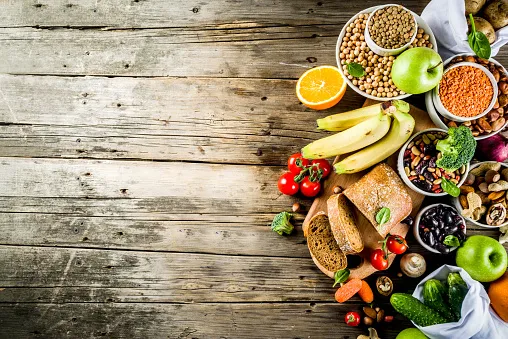
Foods high in fibre (fruits, vegetables, legumes) are good for reducing inflammation. Consuming as little as 17 grams of these foods per day can lead to better lung health.
What are 17 grams? Nothing! You can't say you can't stomach that amount of high-fibre foods.
However, depending on your age you may benefit from different quantities. If you're older than 51 your daily fibre intake should be 30 grams if you're a man and 21 grams if you're a woman. Those under 50 can consume as little as 38 grams for men and 25 grams for women.
Studies have shown that those who consumed foods high in fibre (68.3% of participants) had normal lung function compared with 50.1% who didn't eat as many of these foods. Out of the two groups, airway restriction affected only 14.8% of the participants that ate a high-fibre diet compared with 29.8% airway restrictions in people who didn't consume it.
Even those suffering from COPD have found a significant reduction in their symptoms. Simply put, this is because of the anti-inflammatory properties of high-fibre foods.
Lung diseases are often caused by inflammation, mainly the C-reactive protein is to blame. Therefore, it's important to target this culprit and high-fibre foods do the necessary job.
They also have the ability to improve your gut flora and hence release agents that protect your lungs. These are called neutrophils, a type of white blood cell that is important for your lymphatic system. Another such agent is a short-chain fatty acid.
Seems you weren't lied to as a kid, an apple a day really does keep the doctor away. Go on, grab one right now, you know you want to.
2. Coffee

Coffee was found to have a significant effect in reducing symptoms of asthma. Many sufferers of asthma (including me, I'm just saying) have reported feeling better after taking this magical elixir.
This almost sounds too good to be true, but it's no lie. I sure found this fact to be the best one of the day. You get to drink more of this fabulous drug, who wouldn't want that?
Here's the catch, however, drinking more than two cups of coffee per day can actually increase your risk of lung cancer. So if you're going to indulge in this tasty treat, then be careful not to overdo it.
Still sceptical? Fair, fair. Let's take a look at the numbers.
A compilation of 17 different studies totalling 1.2 million participants from America and Asia shows the truth to the statement. It's also important to mention that in this study, half of the participants were non-smokers.
This sample was tracked for 8.6 years and during that time out of 1.2 million people 20,500 developed lung cancer. This is where the smokers leave a large imprint on the study.
Smokers who consumed more than two cups per day had a whopping 41% risk of developing this terrifying disease than those who didn't drink coffee. Compared to 37% risk of developing cancer in non-smokers who drank more than two cups.
So, maybe if you're going to go for your daily cup of Joe, perhaps don't drink more than two? At least that's the advice of the day according to that study.
However, this begs a question, how exactly does this work? Why is coffee helping?
The caffeine in coffee works in the same way as a bronchodilator drug called theophylline. Except the drug is stronger than its imitator but the point still stands.
Coffee helps your lungs for about two to four hours after it's consumed. So if you hoped to throw your inhaler out of the way, you might want to hold that thought.
But if you do want to include coffee in your mission on keeping your lungs healthy during the plague try to include stronger drinks. Something with high acidity and thus, higher caffeine.
3. Whole grains
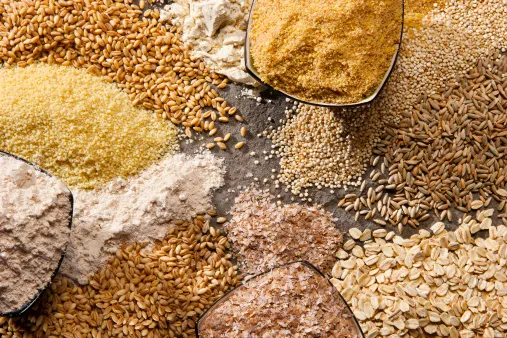
Whole grains like wheat, bulgur, oats, and many others will help keep your lungs in top condition. That is if you cut down on red meat, refined grains, and sugary drinks.
These are the foods that will decrease your chance of developing COPD. This is because whole grains are full of anti-inflammatory properties which, as we've already discussed, are crucial to maintaining lung health.
Another benefit of these foods is that they can help you feel fuller and have a long-lasting shelf life. But what if you're really not a fan of whole grains?
I get you there. Oats can be gross and the rest of these grains can be flavourless at best.
Don't worry, you can trick yourself into eating these foods easily. Next time you make a burger opt for a whole-grain burger bun.
You're into baking? Opt for wholegrain flour. Wholegrain rice is a thing too. Or try making your own oat milk from fresh oats.
It's honestly so simple and takes about five minutes to make. Just grab some oats, add water, blend in a blender, and strain through a muslin cloth.
There you go, higher intake of whole grains already. You know what, let me actually get some oats before I write up on the next superfood for your lungs.
4. Berries
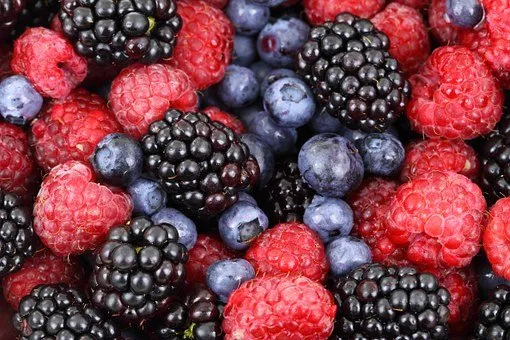
Berries are a tasty little treat and there's a plethora to choose from to maintain your lung health. I started buying packs of mixed berries to snack on daily, which takes care of both my lung health and my five-a-day intake.
Especially red grapes are a good way to maintain your lung health. Studies show that those who consumed dark-coloured fruits had a slower decline in lung function.
So, why dark fruits particularly? They've higher content of a chemical called flavonoid which helps our lungs breathe easier.
This is because it's full of anti-inflammatory properties and has anticancerous and antidiabetic bodies too. A whole three-in-one pack.
However, the catch here is that this doesn't seem to have an effect on smokers. Ex-smokers still received the benefits of consuming berries, hence if you were looking for a reason to quit smoking, this is it.
Drop that cigarette and reap the benefits! I promise you won't regret it and your lungs will thank you later in life.
We're all going to have a decline in our lung functions after we reach our 30's so why not consume more berries to slow down that process? Grab a bit of everything and make a smoothie or a fruit salad. I know, I will make one tonight and I'll use my homemade oat milk as a base.
5. Leafy greens
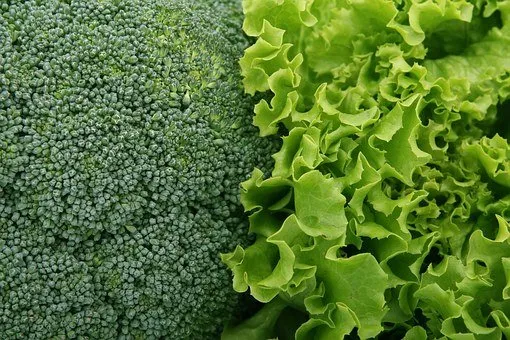
Leafy greens are one of the healthiest, albeit grossest, food options for the proper functioning of any of your organs. But we're focusing on lungs here, so remember to include them in your diet.
Full of antioxidants and anti-inflammatory properties, leafy greens will keep your lungs in top condition if you consume them daily. This is also thanks to vitamin C which protects and maintains the health of your cells.
Leafy greens are a great way to cleanse your lungs because they help remove mucus. Even if its excess is caused by allergies, bacteria, and viruses.
So if that's not a good reason to include them in your diet, I don't know what is. Plus, if you won't eat leafy greens that often, you can cook and freeze them for the future.
But for many people, leafy greens aren't the tastiest foods to eat. Don't blame you really. However, here's a little trick I use to eat more vegetables.
It takes no longer than 20 minutes to prepare this dish full of veggies. Just cut up any vegetables you fancy, toss them in a bit of salt and oil and bake for 10-15 minutes in an oven preheated to 200C. It's super filling and very healthy.
Also, did you know that raw broccoli with yoghurt makes a fantastic salad? It's a health bomb because it's got both leafy greens and dairy. This leads us to a new point.
6. Dairy products
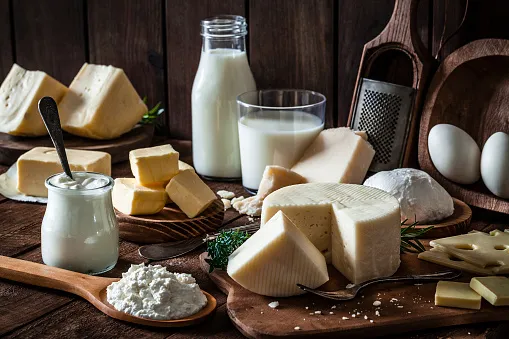
Dairy products have been a source of debate when it comes to lung health. People hesitate mainly because they can increase mucus production which can be adversarial to the lungs.
However, studies have shown that when one consumes milk daily it positively affects lung health. This is because of the high content of vitamin D in dairy products which has high anti-inflammatory properties.
High levels of vitamin D have also been associated with a lower risk of asthma attacks. However, while being important, that's not the only vitamin that plays a role in keeping your lungs healthy and in good condition.
On top of vitamin D, there's also vitamin A, selenium, and magnesium that add benefits. All these vitamins play a role in decreasing inflammation in your lungs.
However, plant-based dairy products are rather low in the above vitamins and may not benefit your lungs at all. While lactose-free milk delivers vitamin A it's not going to provide the same results as regular cow's milk.
Understandably, that might be a deal-breaker for some but worry not! There are plenty of other options you can try other than animal dairy products.
7. Tomatoes
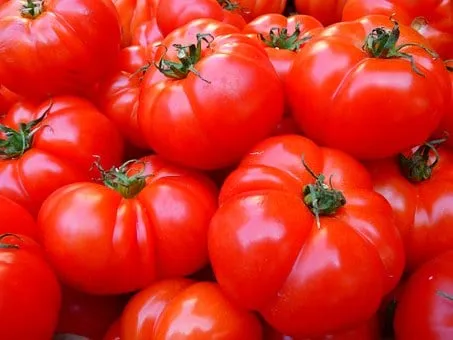
Tomatoes are one of the richest sources of antioxidants called lycopene. If you've COPD or asthma these plump fruits are definitely necessary for your diet.
In addition to their beneficial components, studies suggest that tomatoes may restore the damage caused by smoking. Even consuming as little as one tomato daily showed a significant reduction in the decline of lungs.
They're just that full of anti-inflammatory properties. If that's what they can do for smokers, imagine the benefits non-smokers will reap.
Now, I'll be honest, I'm not a fan of tomatoes. Even though I've heard tales of tomatoes from the farmer's market having a completely different taste to the ones in your local store, I remain sceptical.
And consuming non-alcoholic Bloody Mary's sounds like an option, but then it does make you wonder whether you'll get the same benefits as from eating a fresh tomato. But more on my cocktail-making passions later.
If you're just as averse to tomatoes as I am maybe you could try masking their weird texture by adding them to sandwiches, salads, grab an apple to go along with your tomatoes, or season them with basil. Try making tomato-based soups if you think you'll stomach that.
But if those options don't quite cut it and you want to take tomato consumption to a whole new level, try growing your own. It's as fresh as it gets, you know what fertilizer has been used and these fruits grow just fine in a pot outdoors.
So give it a go. I think the benefits far outweigh having to bear the taste of tomatoes.
8. Pumpkin
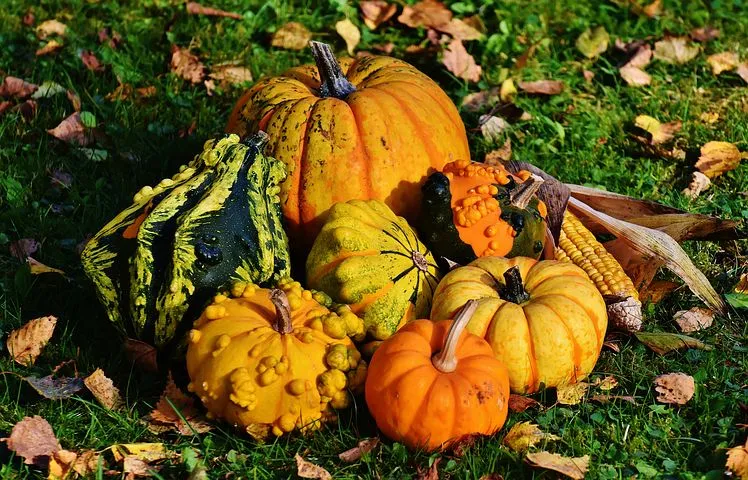
Pumpkins are not only tasty but a really healthy vegetable too. With Halloween just around the corner, this is an as good time as ever to indulge in these spooky treats.
Pumpkins protect your lungs against cancer and reduce inflammation. But if whole pumpkins aren't your thing, don't worry, you can snack on their seeds.
Besides you only need 80g of pumpkin to count as part of your five-a-day. That's three heaped tablespoons, so pretty manageable and easy to include in your diet.
Pumpkin seeds are fantastic for your lungs because they're full of beta carotene, vitamin C, and antioxidants. I add some of these seeds to my Greek yoghurt and let me tell you, the combination makes both the seeds and yoghurt a lot more palatable.
Besides, dairy and pumpkin combined in one? I think that's a life hack for healthier lungs in one meal.
So if you're going to carve a Halloween pumpkin this year, don't forget to keep the seeds for roasting and the pulp for a nice pumpkin pie. Just because you've bought a pumpkin for decoration doesn't mean you can't reap its health benefits too, am I right?
9. Beets
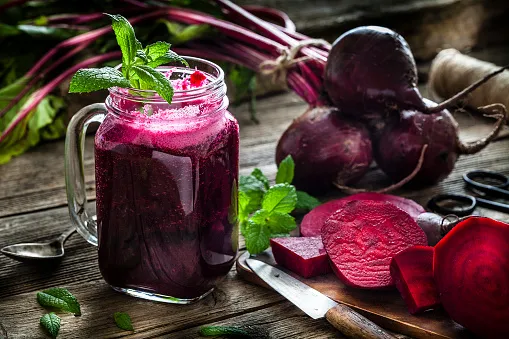
Beets have one of the best compounds for lung function. These red health bombs are full of nitrates which help oxygen uptake, relax blood vessels and reduce blood pressure.
Beets are able to improve muscle contractions in your diaphragm which leads to easier breathing. They've also been shown to be effective in fighting off viral respiratory symptoms, even the more severe ones.
So if beets can battle severe viral symptoms then definitely consume these bad boys during the pandemic! I don't see how much better it can get than this. It's important to mention that it's best to eat them raw or juice them as they will keep their most nutritious properties that way.
But if you like, you can make them into a smoothie or roast them instead. Raw beets aren't for everyone, after all.
I'll be honest, beets are on my no-go list, they're not the most pleasant. However, after learning about their properties and that they're the richest source of vitamins necessary to keep infections at bay I'm definitely willing to suffer for the sake of keeping my lungs safe.
Just make sure they don't get anywhere near your clothes because that's a nightmare to wash off. Seriously. Seriously, don't let them stain your clothes.
10. Turmeric
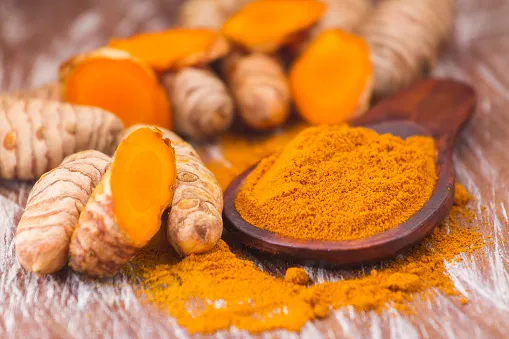
Turmeric is a fantastic way to keep your lungs healthy, especially if you're recovering from a common cold. But if you're looking for preventative measures you honestly can't go any better than turmeric.
It's closely related to ginger and has plenty of anti-inflammatory properties as well as being a perfect lung cleanser. But the catch here is when you're eating dishes with turmeric you have to add black pepper to boost its effectiveness.
Yes, even if you're brewing it into tea. However, you'd need to consume turmeric daily to reap its benefits fully.
I know, it sounds annoying. You don't always feel like drinking turmeric tea or grating it in your food.
But alas, this is the cost you have to pay for healthy lungs. So add that turmeric into your diet and don't forget to season with black pepper.
I hope you've found this list helpful. Obviously, you should still take the necessary precautions, eating healthy foods alone won't save your lungs.
But it's still a nice bit of knowledge, so you can incorporate these foods into your diet. I hope you're taking care of yourself and your lungs! Stay safe.
Opinions and Perspectives
I love how comprehensive this list is! Been trying to improve my lung health and these food suggestions are really practical. Already have most of them in my kitchen!
The coffee part really surprised me. I had no idea it could help with asthma, but that two cup limit is something to keep in mind.
Interesting article but I'm wondering about portion sizes. Does anyone know how much of these foods we should eat daily for optimal benefits?
Just want to point out that while berries are great, they can be quite expensive. Frozen ones work just as well though and are usually cheaper.
My grandmother swears by turmeric tea with black pepper. I thought she was just being traditional but now I see there's science behind it!
Not a fan of beets personally, but I guess I'll have to find a way to incorporate them. The benefits sound too good to pass up.
I find it easier to add leafy greens to smoothies. Can barely taste them but still get all the benefits.
The connection between fiber intake and lung health is fascinating. Never would have made that connection!
Does anyone have good recipes for incorporating more pumpkin into their diet? Besides the obvious pumpkin pie?
Been drinking coffee for years and my asthma has always been well-controlled. Now I know why!
Actually, you can make pumpkin soup, roasted pumpkin salad, or even pumpkin curry. I do it year-round, not just during fall.
Anyone else struggling with the turmeric and black pepper combo? I find the taste quite strong.
Try mixing turmeric in golden milk with honey and cinnamon. Makes it much more palatable.
The whole grain suggestion is great but some people might be gluten sensitive. Would quinoa work as an alternative?
Surprised spinach wasn't specifically mentioned in the leafy greens section. It's my go-to for lung health.
The dairy section seems a bit controversial. I've always heard it increases mucus production.
Good point about frozen berries! I buy them in bulk when they're on sale and use them throughout the year.
I blend beets with apples and carrots. Completely masks the earthy taste while keeping all the benefits.
Really appreciate the scientific studies being referenced. Makes the information more credible.
What about people who are lactose intolerant? Any alternatives to get those same benefits?
You can get similar benefits from fortified plant milk, especially vitamin D fortified ones.
The coffee limit is disappointing news for me. I usually drink 4-5 cups daily.
Maybe try switching some of your coffee to green tea? It has similar benefits without the risks.
Anyone tried growing their own tomatoes? Wondering if it's worth the effort.
Homegrown tomatoes taste completely different from store-bought! Much sweeter and more flavorful.
The fiber recommendations seem quite high. I'm struggling to reach even the minimum.
Start slow and gradually increase your fiber intake to avoid digestive issues.


